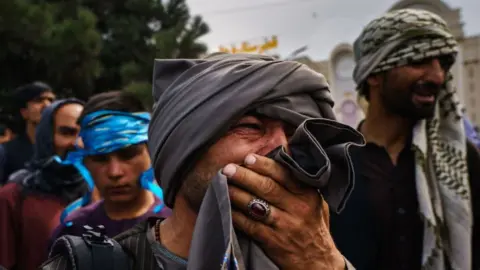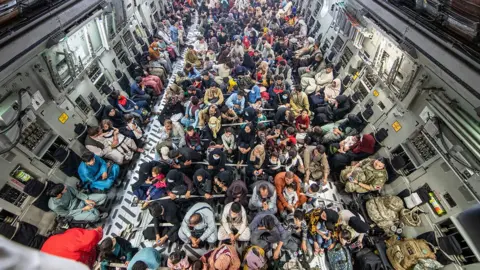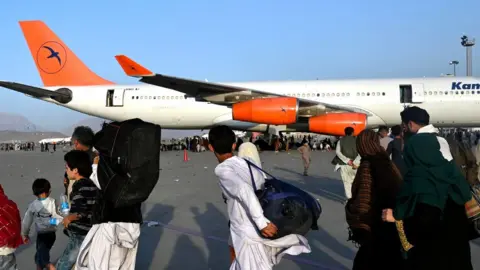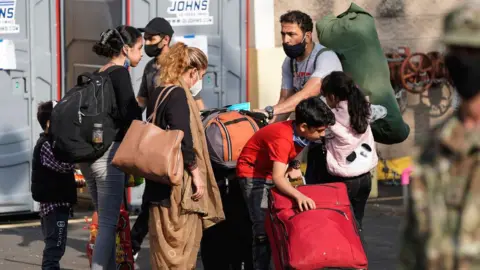Afghanistan: How many people has the UK resettled?
 LA Times via Getty Images
LA Times via Getty ImagesTwo years after the Taliban took Kabul, a think tank has criticised the UK's treatment of people escaping from Afghanistan.
More in Common said some had been living in hotels for two years, and now faced eviction.
How many Afghans have arrived in the UK?
The government says that around 24,600 people had arrived in the UK from Afghanistan as of the end of March 2023, including British nationals.
Of these, about 21,000 have been resettled under different schemes.
Most came as part of Operation Pitting, the British military operation to evacuate British nationals and Afghans from Kabul which began in August 2021.
- About 2,000 came before Operation Pitting
- 15,000 arrived during Operation Pitting
- 7,000 have arrived since
 Ministry of Defence
Ministry of DefenceIn written evidence to the Foreign Affairs Committee in November 2021, Raphael Marshall - who previously worked on the Foreign Office's Afghanistan crisis response - estimated that between 75,000 and 150,000 people had applied for evacuation in August 2021, of whom 5% received assistance.
The Home Office said another 1,400 former staff and their families had already been relocated since 2013 under an earlier scheme.
What are the Afghan resettlement schemes and how do they work?
In April 2021 - before the Taliban took control of Afghanistan - the government launched the Afghan Relocations and Assistance Policy (ARAP) scheme.
Under ARAP, Afghans who worked for the British military and UK government - for example, as interpreters - could apply to settle permanently in the UK, rather than get five years' residency, which was previously offered.
The government also opened the Afghan Citizens' Resettlement Scheme (ACRS) in January 2022, which it said would allow up to 20,000 refugees to settle in the UK.
This scheme focuses on women and children as well as religious and other minorities in danger from the Taliban.
Immediate family members of those eligible under either the ARAP or ACRS schemes are also eligible for resettlement in the UK.
 WAKIL KOHSAR
WAKIL KOHSARHow much money is the government spending on the Afghan resettlement schemes?
As part of an initiative called "Operation Warm Welcome", local councils have been allocated funding packages of £20,520 per person over three years.
The money should help refugees enrol in education, find work and integrate in their new communities.
The government promised an additional £10m in the first year for housing costs, then £5m and £2m in the two following years.
What accommodation have Afghan refugees been offered?
The government announced £35m to help local authorities move around 8,000 Afghans out of hotels and into permanent homes across the UK. It promised a further £250m for the local authority housing fund.
The refugees were given three months to vacate their hotels for relocation.
At the end of March 2023, the Home Office said that just under 1,000 refugees had been moved into permanent accommodation, and another 468 were waiting to move in.
However, 8,799 Afghan refugees were still living in hotels or serviced accommodation, with one man telling the BBC he had spent almost two years in a hotel.
According to the Home Office, 315 households (around 1,200 people) refused accommodation offers for "varied and often justifiable reasons".
Cabinet Office minister Johnny Mercer - who served in Afghanistan during his time in the military - told the BBC that "things could always have been done differently", and that some Afghan families had been in hotels "for far too long".
In February 2022, the Home Office said that accommodating Afghan refugees in hotels cost £1.2m per day.
How can other Afghans come to the UK?
In theory, they can come through the UK Resettlement Scheme which prioritises refugees from regions in conflict. In 2022, 36 Afghans came through this route.
Some Afghans have also made their way to the UK and then sought asylum.
The number of Afghans arriving in the UK on small boats, which have crossed the English Channel has increased sharply:
- 2020: 494
- 2021: 1,437
- 2022: 8,633
In the first three months of 2023, 1,054 arrived this way.
Home Office statistics show that nearly 11,000 Afghans and their dependents applied for asylum in 2022.
However, the Illegal Migration Bill, which became law in July 2023, means anyone arriving illegally may be detained and removed either to Rwanda, or another so-called "safe" third country.
There are continuing legal challenges to the Rwanda policy.
How many people did other countries evacuate?
The US evacuated the largest number of people from Afghanistan after the Taliban seized power.
From 14 August to 28 August 2021, it got 113,500 people out.
 Getty Images
Getty ImagesOther countries evacuated much smaller numbers over that period, according to official statements and press releases:
- Germany: more than 5,300
- Italy: more than 5,000
- Canada: more than 3,700
- France: around 3,000
Since August 2021, some countries have continued to carry out occasional evacuations. On December 3 of that year, France said that it had evacuated 258 people from Afghanistan.
There was also an increase in the number of Afghans who applied for asylum in some EU countries such as Greece, France and Germany.
